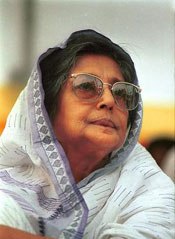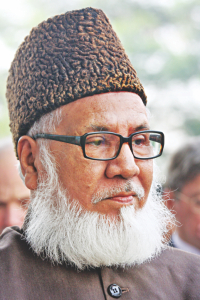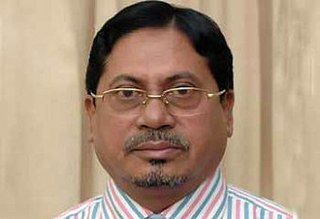Related Research Articles

Jahanara Imam was a Bangladeshi writer and political activist. She is known for her efforts to bring those accused of committing war crimes in the Bangladesh Liberation War to trial. She has been called "Shaheed Janani".

Ghulam Azam was a Bangladeshi Islamist politician and the former leader of Bangladesh Jamaat-e-Islami, a largest Islamist political party in Bangladesh.

Motiur Rahman Nizami was a politician, former Minister of Bangladesh, Islamic scholar, writer, the former leader of the Bangladesh Jamaat-e-Islami and war criminal. He was the leader of the anti-Bangladesh militia group Al-Badr during the Bangladesh Liberation War in 1971. On 29 October 2014, he was convicted and later executed for his role in masterminding the Demra massacre by the International Crimes Tribunal of Bangladesh. He was the Member of Parliament for the Pabna-1 constituency from 1991 to 1996 and again from 2001 to 2006. He also served as the Bangladeshi Minister of Agriculture and Minister of Industry.
Razakar was an anti-Bangladesh paramilitary force organised by the Pakistan Army in then East Pakistan, now called Bangladesh, during the Bangladesh Liberation War in 1971. Since the 1971 war, it has become a pejorative term in Bangladesh due to the numerous atrocities committed by the Razakars during the War. The Razakar force was composed of mostly anti-Bangladesh and pro-Pakistan Bengalis and Urdu-speaking migrants who lived in Bangladesh at the time.

Ali Ahsan Mohammad Mojaheed was a former Bangladeshi politician who served as a Member of Parliament and as the Minister of Social Welfare from 2001 to 2007 of Bangladesh and was convicted of war crimes during the 1971 Liberation war of Bangladesh. He received death penalty by the International Crimes Tribunal of Bangladesh on 22 November 2015, becoming one of the world's first Ministers to be hanged. He was second in command of the infamous paramilitary force, Al-Badr in 1971, which committed war crimes at that time. Until his death, he was the Secretary General of Bangladesh Jamaat-e-Islami. On 17 July 2013, Ali Ahsan Mohammad Mujaheed was found guilty of war crimes such as genocide, conspiracy in helping to kill intellectuals and abduction during the 1971 Liberation war of Bangladesh by the International Crimes Tribunal-2 and sentenced him to death for 2 of the 7 charges brought against him. High Court rejected his review petition on 18 November 2015.

Muhammad Kamaruzzaman was a Bangladeshi politician and journalist who served as the senior assistant secretary general of Bangladesh Jamaat-e-Islami and was convicted of war crimes during the 1971 Liberation war of Bangladesh. He was executed by hanging at Dhaka Central Jail at 22:01 on 11 April 2015.

Shahriyar Kabir is a Bangladeshi journalist, filmmaker, human rights activist, and author of more than 70 books focusing on human rights, communism, fundamentalism, history, and the Bangladesh war of independence. He was awarded Bangla Academy Literary Award in 1995.
1992 (MCMXCII) was a leap year starting on Wednesday of the Gregorian calendar, the 1992nd year of the Common Era (CE) and Anno Domini (AD) designations, the 992nd year of the 2nd millennium, the 92nd year of the 20th century, and the 3rd year of the 1990s decade.
The history of Bangladesh (1971–present) refers to the period after the independence of Bangladesh from Pakistan.
Bangladesh Jamaat-e-Islami, previously known as Jamaat-e-Islami Bangladesh, or Jamaat for short, is the largest Islamist political party in Bangladesh. On 1 August 2013, the Bangladesh Supreme Court declared the registration of the Bangladesh Jamaat-e-Islami illegal, ruling that the party is unfit to contest national elections.

The International Crimes Tribunal (Bangladesh) is a domestic war crimes tribunal in Bangladesh set up in 2009 to investigate and prosecute suspects for the genocide committed in 1971 by the Pakistan Army and their local collaborators, Razakars, Al-Badr and Al-Shams during the Bangladesh Liberation War. During the 2008 general election, the Awami League (AL) pledged to try war criminals. The government set up the tribunal after the Awami League won the general election in December 2008 with a more than two-thirds majority in parliament.

On 5 February 2013, protests began in Shahbag, Bangladesh following demands for capital punishment for Abdul Quader Mollah, who had been sentenced to life imprisonment, and convicted on five of six counts of war crimes by the International Crimes Tribunal of Bangladesh. Later demands included banning the Bangladesh Jamaat-e-Islami party from politics including election and a boycott of institutions supporting the party.
The Nirmul Committee was founded on 19 January 1992 by 101 Bangladeshi activists to seek justice for the genocide carried out during the Bangladesh liberation war. Operating in Bangladesh and Britain they claim the policies of the Jamaat-e-Islami are similar to those of the British National Party. The London branch protested against the arrival of Delwar Hossain Sayeedi at a Mosque in East London and demanded his British visa be revoked.
The Collaborators Act was a law enacted in 1972 by the government of Bangladesh to try those who did not side with the nationalist cause in the Bangladesh Liberation War, or politically opposed the liberation war or willingly cooperated with the Pakistan Army or committed criminal acts. This law is referred as the Bangladesh Collaborators Order 1972, commonly known as Collaborators Act, 1972.

The movement demanding trial of war criminals is a protest movement in Bangladesh, from 1972 to present.
Maulana Abul Kalam Muhammad Yusuf was a Bangladeshi religious scholar, writer, activist and politician. Yusuf was a specialist in the study of Hadith : he earned the title "Mumtaz al-Muhaddethin" for his advanced degree in hadith sciences, and has also published books widely in the field.
Gopal Krishna Muhuri was the principal of Nazirhat College in Chittagong, Bangladesh, who was murdered in his home. The Daily Star described the case as "sensational".
Abdullahil Amaan Azmi is a former Bangladeshi Army officer and the son of Ghulam Azam, the former Amir of Bangladesh Jamaat-e-Islami. He was a victim of Forced disappearance in Bangladesh.
References
- ↑ "NU gets Jahanara Imam Memorial Award". observerbd.com. Retrieved 30 June 2018.
- ↑ "'Today's verdict dedicated to Jahanara Imam'". The Daily Star. 3 May 2016. Retrieved 30 June 2018.
- ↑ Thiranagama, Sharika; Kelly, Tobias (2011). Traitors: Suspicion, Intimacy, and the Ethics of State-Building. University of Pennsylvania Press. p. 58. ISBN 978-0-8122-0589-3.
- ↑ "Jahanara Imam's 20th death anniversary today". Dhaka Tribune. 25 June 2014. Retrieved 30 June 2018.
- ↑ Caṭṭagrāma Biśvabidyālaẏa Samāja Bijñāna Jārnāla. Chittagong University. 2007. p. 84.
- 1 2 "Gono Adalot 1992". International Crimes Research Foundation. Retrieved 30 June 2018.
- ↑ "21 long years after, finally". The Daily Star. 16 July 2013. Retrieved 30 June 2018.
- 1 2 Karim, Lamia (2011). Microfinance and Its Discontents: Women in Debt in Bangladesh. U of Minnesota Press. p. 22. ISBN 978-0-8166-7094-9.
- ↑ Armbruster, Heidi; Lrke, Anna (2008). Taking Sides: Ethics, Politics, and Fieldwork in Anthropology. Berghahn Books. p. 75. ISBN 978-1-84545-701-3.
| This article about a Bangladeshi organisation is a stub. You can help Wikipedia by expanding it. |